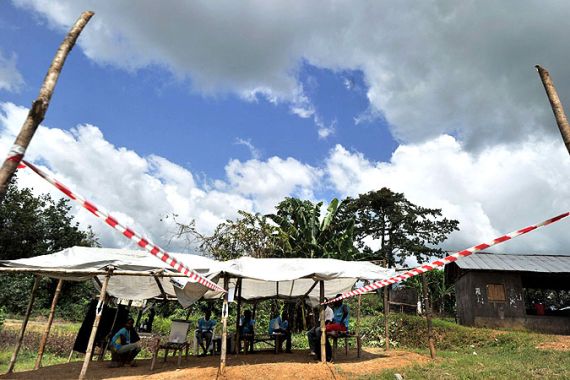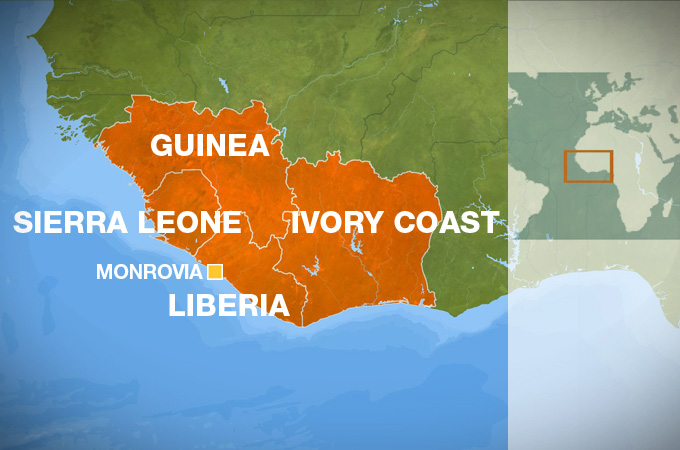Liberia polls marred by boycott and violence
Incumbent Ellen Johnson Sirleaf set for re-election as opposition boycott and violence contribute to low turnout.

 |
| The election is the first organised by the government since the end of the civil war eight years ago [Reuters] |
Polling stations have closed in Liberia after a presidential run-off in which incumbent President Ellen Johnson Sirleaf is poised to win a second term after her closest rival boycotted the vote, citing fraud concerns.
“There were no incidents reported from the various polling places and all have already closed at 6pm (1800GMT),” Joseph Yassiah, spokesman of the electoral commission, said on Tuesday.
Yassiah said he could not yet comment on the voter turnout, but news agencies had reported earlier that the effect of the boycott by Winston Tubman of the Congress for Democratic Change (CDC) was evident in the visibly reduced voter queues.
Some polling stations had no more than a dozen people waiting to cast their ballots.
Some polling stations closed before the published time on Tuesday evening, when it became clear that no more voters would show up.
At four polling stations in the West Point area of the capital, the turnout was very low – with only 83 ballots cast out of 383 registered voters at one, for example, representing just 21 percent voter turnout.
Al Jazeera’s Yvonne Ndege, reporting from the capital Monrovia, said that a quiet atmosphere around the polling stations might have been a consequence of Monday’s violence.
“There is a sense that people are afraid to come out and vote [and] this could naturally have an impact on turnout,” she said.
“The opposition is calling for protests today and asking their supporters to wear black, and are calling today a funeral for democracy in Liberia.”
Human rights group Amnesty International on Tuesday called for an independent and impartial investigation into possible human rights abuses during the election period after several people died in clashes between police and opposition supporters in Monrovia.
‘Defining moment’
During the first round of voting last month, voters camped out on the pavement and waited for hours to cast their ballot because of the high turnout.
The vote was held just days after Sirleaf, Africa’s first female elected president, was named winner of this year’s Nobel Peace Prize.
 |
The poll was preceded by violence on Monday in Monrovia, but about 4,500 polling stations opened as scheduled on Tuesday.
Sirleaf’s fellow Liberian Nobel laureate, Leymah Gbowee, turned out to vote, saying the election was a “defining moment” for her country’s fragile democracy.
“Liberians lived in fear for so many years and today people … have defied fear and intimidation and stepped out to vote,” she told the AFP news agency.
Other voters insisted they would cast their ballots as international election monitors said Tubman’s claims of fraud were unsubstantiated.
“It’s about our future and our children’s. Even if I don’t want the government, it does not mean I can’t vote,” said Kollie Kennedy, who was waiting her turn at a polling station set up inside a Pentecostal church. “It’s about Liberia.”
Monie Cooper, who was near the front of the line at the same polling station in Monrovia, said elections were important.
“I call on those boycotting the poll to ignore the ignorance and show up to vote,” she said.
Opposition boycott
The US and the UN also called on Tubman, a Harvard and Cambridge graduate, to take part saying the vote was free and fair, but their entreaties went unheeded.
The presidential election is the first organised by the government rather than by the United Nations since the end of the west African nation’s civil war eight years ago.
Tubman claims the electoral process is rigged in his opponent’s favour and says this week’s violence was further evidence that the vote should have been postponed.
However analysts say Tubman is boycotting not because of fears of fraud but because he knew he could not win.
“If you look at the figures, you can see that Tubman is almost certainly going to lose. He is 12, 13 points down in the polls,”‘ said Stephen Ellis, the author of a history of the Liberian civil war and a researcher at the African Studies Center in the Netherlands.
“It’s an obvious calculation. He withholds legitimacy from the government,” Ellis said.
“If it was felt by a large part of population to not be legitimate, in a place like Liberia, with its history, it becomes quite worrying.”